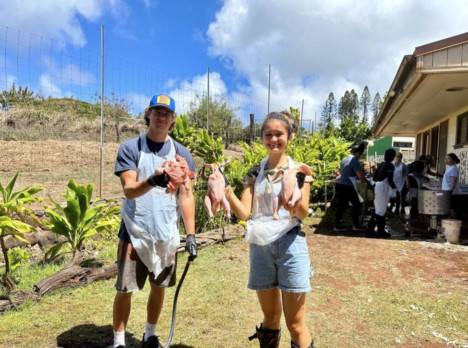Mahi’ai Moa Project Enters Final Phases
By Maria Angst, Community Reporter

Photo by Sonja Angst.
The Molokai community recently had a great opportunity to increase local poultry production, bolster the island’s economy, and assist farmers and ranchers in achieving their business objectives: the Mahi’ai Moa project.
This five-month educational program for aspiring farmers focused on commercial broiler chicken production, incorporating a mix of in-person and virtual classes.
Participants were granted access to informative sessions with J. Ludovico Farm and the College of Tropical Agriculture and Human Resources (CTAHR).
In addition, they received field trips off-island, personalized farm business guidance from specialists, a ready-made market for broiler bird sales, a collaborative farmer-to-farmer support structure, and a generous $4,000 allocation for supplies to kickstart their chicken venture.
After raising baby broiler chicks and receiving months of farming instruction, which included tasks such as constructing chicken enclosures, feeding, and implementing predator control measures, the participants were prepared for the final phase of the project.
Over the past two weekends, participants engaged in their “final exam” of the Mahiʻai Moa project, where they demonstrated their proficiency, acquired knowledge, and months of preparation by showcasing the proper techniques for slaughtering and butchering a broiler chicken.
“We had a general idea, but we didn’t know exactly what the setup would be like,” said Lori Pastrana, manager of farmer training for Sustʻainable Molokai, as she monitored the butchering process. “[The project] was better than what we were expecting. It’s working. The participants are able to go from start to finish and that’s what I care about.”
Many participants felt the same way in this chicken project, explaining that it has been an “eye-opening journey,” expanding their knowledge of poultry production and instilling a deeper appreciation for Molokai’s local agricultural community and its potential for growth and sustainability.
“It feels really good that our kids are learning how to live like this,” said Eden Carney, Mahi’ai Moa participant, as she watched her sons clean and prep the chickens.
“The last two years we’ve been focusing on hands-on learning about where food comes from and how to be more sustainable. Being part of Sust’ainable Molokai’s program, our boys are part of every aspect of this. [They] take care of the hens, pull the eggs. They’re already ma’a to it.”
Carney mentioned that her family had previously raised ducks for both eggs and meat even before they introduced chickens. Now that they’ve added chickens to the mix, it’s one less item her family needs to purchase from the store.
“We mainly eat deer meat and fish, and now we’ve added duck and chickens,” said Carney. “It’s good that most of our proteins are from Molokai now, which is really exciting…Now my kids, they get ono for it. They have the flavor of the island kind of food.”
For more information on future programs like Mahi’ai Moa, Molokai residents can contact Lori Pastrana at Lori@sustainablemolokai.org.











Don't have a Molokai Dispatch ID?
Sign up is easy. Sign up now
You must login to post a comment.
Lost Password